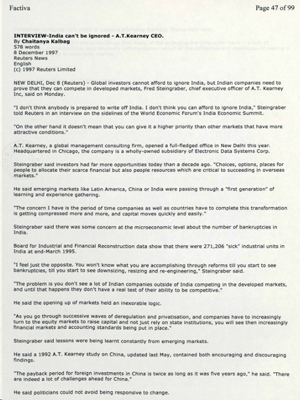INTERVIEW-India can’t be ignored – A.T.Kearney CEO
[Reuters]
Published date: 8th Dec 1997
8 December 1997
Reuters News
English
(c) 1997 Reuters Limited
NEW DELHI, Dec 8 (Reuters) – Global investors cannot afford to ignore India, but Indian companies need to prove that they can compete in developed markets, Fred Steingraber, chief executive officer of A.T. Kearney Inc., said on Monday.
“I don’t think anybody is prepared to write off India. I don’t think you can afford to ignore India,” Steingraber told Reuters In an Interview on the side lines of the World Economic Forum’s India Economic Summit.
“On the other hand it doesn’t mean that you can give it a higher priority than other markets that have more attractive conditions.”
A.T. Kearney, a global management consulting firm, opened a full-fledged office in New Delhi this year. Headquartered in Chicago, the company is a wholly-owned subsidiary of Electronic Data Systems Corp.
Steingraber said Investors had far more opportunities today than a decade ago. “Choices, options, places for people to allocate their scarce financial but also people resources which are critical to succeeding in overseas markets.”
He said emerging markets like Latin America, China or India were passing through a “first generation” of learning and experience gathering.
“The concern I have is the period of time companies as well as countries have to complete this transformation is getting compressed more and more, and capital moves quickly and easily.”
Steingraber said there was some concern at the microeconomic level about the number of bankruptcies in India.
Board for Industrial and Financial Reconstruction data show that there were 271,206 “sick” industrial units in India at end-March 1995.
“I feel just the opposite, You won’t know what you are accomplishing through reforms till you start to see bankruptcies, till you start to see downsizing, resizing and re-engineering,” Steingraber said.
“The problem is you don’t see a lot of Indian companies outside of India competing In the developed markets, and until that happens they don’t have a real test of their ability to be competitive.”
He said the opening up of markets held an inexorable logic.
“As you go through successive waves of deregulation and privatisation, and companies have to increasingly turn to the equity markets to raise capital and not just rely on state institutions, you will see then increasingly financial markets and accounting standards being put in place.”
Steingraber said lessons were being learnt constantly from emerging markets.
He said a 1992 A.T. Kearney study on China, updated last May, contained both encouraging and discouraging findings.
“The payback period for foreign investments in China is twice as long as it was five years ago, ” he said. “There are indeed a lot of challenges ahead for China.”
He said politicians could not avoid being responsive to change.
“People are going to have options. Companies are going to have options. Pretty soon the politicians are going to find out that if they don’t find ways to keep the people, keep the consumption, keep the investment within their environment, they are no longer going to have a value-added basis for maintaining their position in government. “
Perception mattered very much in gauging emerging markets, Steingraber said.
“I think India suffers from the same things that many of the emerging markets suffer from — a lack of information, misperceptions, and obviously communication about all the difficulties and challenges of making a success of going to an emerging market.”
(c) Reuters Limited 1997






